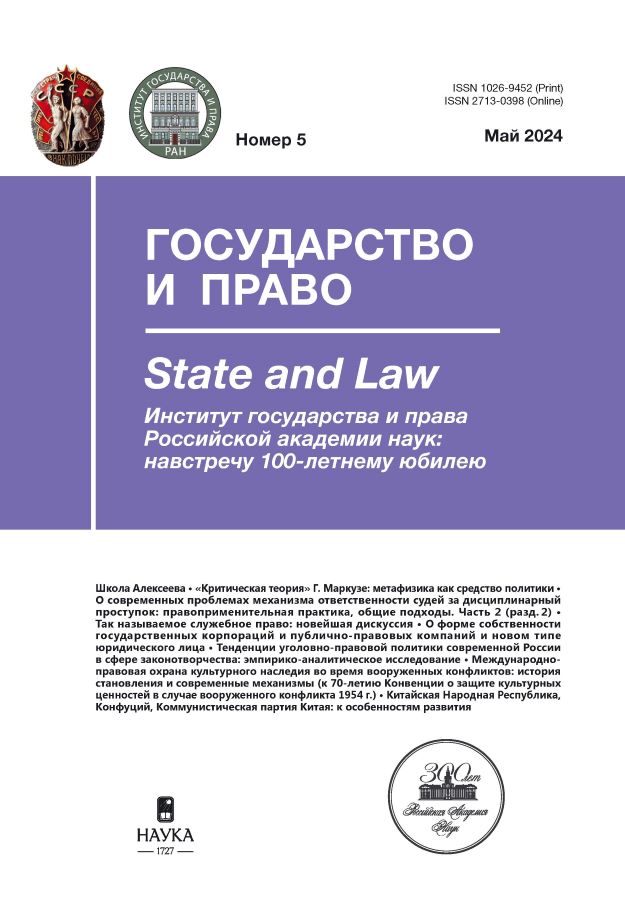Social security agreements citizens of the member states integration associations
- Authors: Kolotova N.V.1
-
Affiliations:
- Institute of State and Law of the Russian Academy of Sciences
- Issue: No 5 (2024)
- Pages: 78-88
- Section: Rights and freedoms of a man and a citizen
- URL: https://rjmseer.com/1026-9452/article/view/648943
- DOI: https://doi.org/10.31857/S1026945224050086
- ID: 648943
Cite item
Abstract
The article notes that the development of cross-border migration and the internationalization of the labor market leads to the fact that an increasing number of people permanently or permanently reside outside their countries of origin and citizenship. Migration processes are developing most actively in regional integration associations. In order for citizens not to experience difficulties in exercising their social rights when moving from one participating State to another, multilateral agreements are concluded in them aimed at preserving acquired social rights and the grounds for obtaining them. Analysis of such agreements in force in integration associations established in Europe (EU), in the Eurasian Space (EAEU), in Latin America (the Common Market of South American Countries MERCOSUR and the Andean Community), the Caribbean States (Caribbean Community CARICOM), the interregional Ibero-American Community, as well as emerging in Africa (Inter-African The SIRPES Social Insurance Conference makes it possible to identify common and different legal mechanisms used to ensure the social rights of migrants. All these agreements contribute to the coordination of the social policy of the participating States in order to ensure equal access to social rights and the continuity of their provision in the case of interstate migration within the integration association, but do not imply the harmonization of social legislation.
Full Text
About the authors
Natalia V. Kolotova
Institute of State and Law of the Russian Academy of Sciences
Author for correspondence.
Email: kolotova.n@gmail.com
PhD in Law, Associate Professor, Leading Researcher, Acting Head of the Sector of Human Rights
Russian Federation, MoscowReferences
- Akatnova M. I. Preservation of the right to pension provision for workers of the EAEU Member States // Herald of Kutafin University (MGUA). 2019. No. 11. P. 153 (in Russ.).
- Asymmetries of regional integration projects of the XXI century / ed. by V. I. Mikhailenko. Yekaterinburg, 2018. P. 40 (in Russ.).
- Bortko Yu. A., Bisson L. S. European integration: restarting the idea of a “Social Europe” // Modern Europe. 2019. No. 6. Pp. 5–17 (in Russ.).
- Vasilieva T. A. Problems of the realization of social rights in the context of integration and economic crisis: the practice of the EU member states // Transformation of human rights in the modern world / ed. by A. N. Savenkov. M., 2018. Pp. 154–166 (in Russ.).
- Dutkevich P., Kazarinova D. B. The end of the era of globalization // Herald of the RUDN. Ser.: Political Science. 2017. Vol. 19. No. 1. P. 12 (in Russ.).
- Zuev V. N. Methodology of classification and assessment of forms of regional integration // Eurasian economic integration. 2014. No. 3 (24). P. 36 (in Russ.).
- Kostyunina G. M. The ASAEN+1 integration model: the main provisions of the agreements and the impact on foreign economic relations // Herald of the RUDN. Ser.: International Relations. 2017. Vol. 17. No. 3. P. 444 (in Russ.).
- Course of International Law: in 7 vols. Vol. 7: International legal forms of integration processes in the modern world. M., 1993. P. 26 (in Russ.).
- International and Russian norms of pension provision: a comparative analysis / ed. by E. G. Tuchkova, Yu. V. Vasilieva. M., 2013. P. 306 (in Russ.).
- Pimenova O. I. Legal integration in the European Union and the Eurasian Economic Union: a comparative ana-lysis // Herald of the International organizations. 2019. Vol. 14. No. 1. P. 83 (in Russ.).
- Rafalyuk E. E., Zaloilo M. V., Vlasova N. V. Legal models of integration associations of the states of Eurasia and Latin America // Journal of Foreign Legislation and Comparative Jurisprudence. 2017. No. 2 (63). Pp. 103, 104 (in Russ.).
- Chirkov S. A. Preservation of pension rights of citizens during their resettlement to other countries: theoretical foundations // Russ. the yearbook of Labor Law. 2010. No. 5. P. 496 (in Russ.).
- Holzmann R. The Cross-Border Portability of Social Bene-fits // Ifo Institute – Leibniz Institute for Economic Research at the University of Munich. München. 2018. Vol. 16. Iss. 1. Р. 18.
- Putri Ratu Danielle. Australias’ membership in the Association of Southwest Asian Nation in the Relation with Human Rights Policies // Padjadjaran Journal of International Law. 2020. Vol. 4. Iss. 1. Pp. 94–113.
- Sánchez-Rodas Navarro C. Aproximación a la coordinación de regímenes de seguridad social en el reglamento 883/2004 y en el Convenio Multilateral Iberoamericano de Seguridad Social // e-Revista Internacional de la Protección Social. 2016. No. 1 (1). Pp. 1–11.
- Theories of New Regionalism / ed. by Söderbaum Fredrik and Shaw Tim. N.Y., 2003. P. 4.
- Wrschraegen G. Social security and social integration: The multiple functions of welfare policies // Invisible Social Security Revisited: Essays in Honour of Jod Berghman Hardcover / eds: W. V. Oorschot, H. Peeters, K. Boos. Lannoo Campus Publishers, 2015. Р. 55.
- Zavando Cerda D., Gómez Urquijo L. Improving the protection of migrant workers with work histories in the European Union and Ibero-America: Enhancing the coordination of international social security instruments // International Social Security Review. 2023. Vol. 76. Iss. 3. P. 25–45.
Supplementary files










